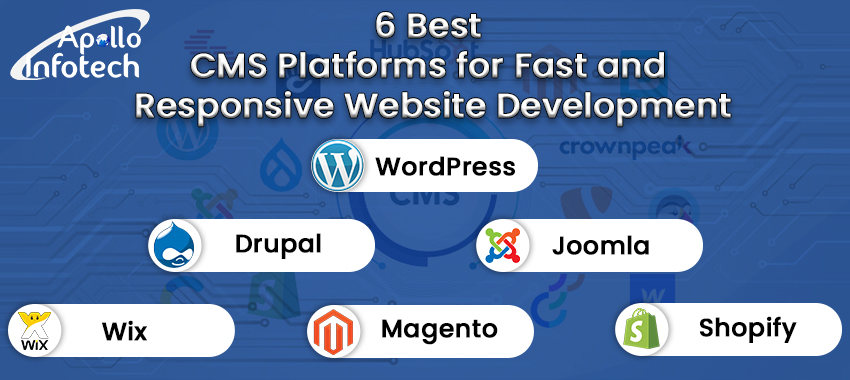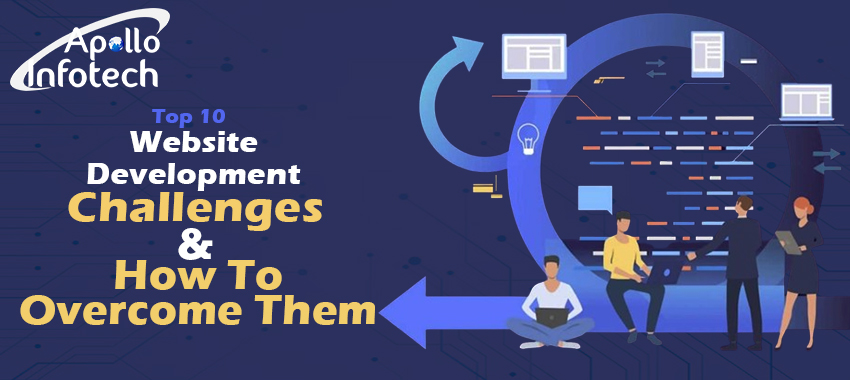
6 Best CMS Platforms for Fast and Responsive Website Development
The website of any digital business is the initial contact point between the company and its targeted customers. No matter whether it's a personal blog, business website, or online store, an efficient content management system is vital in the creation of fast and responsive websites. The right CMS platforms for website development can make the whole building, managing, and maintaining process of a website much easier. Let's dive into the six best CMS platforms that can help you achieve a responsive design, optimized performance, and the most engaging user experience.
1. WordPress: The King of CMS Platforms
CMS platform for website development cannot be denied to WordPress, with its versatility and ease of use. This is why it is the platform that powers a third of all websites on the internet. Great about WordPress is that it offers an extensive range of themes and plugins. It is easy for newbies yet powerful for professional developers. With WordPress, you have access to a huge library of plugins that can enhance the functionality of your site, whether it's SEO tools or eCommerce integrations. This platform also offers a very user-friendly interface so that you can easily manage your content without any coding knowledge. If you are focusing on website development with a fast setup and responsive design, WordPress is the best for you.
Pros:
- Extensive customization options
- Large community support
- SEO-friendly features
- Ranging from a myriad of plugins and themes
Cons:
- Often prone to constant updates
- Easily prone to hacking attempts if appropriate protection does not prevail
2. Joomla: The Versatile Content Management System
Joomla is another powerful content management system that's widely used on the web. Joomla has also been recognized for its flexibility and is often preferred by more demanding developers who require more customization than WordPress could allow. Joomla's robust framework is actually intended to help make building complex sites straightforward, which makes it ideal for companies that require scalable solutions. Joomla has a user-friendly administrator, which makes it very easy to add and manage content. It also supports multiple languages, and that's one more reason why this platform can be used for companies targeting a global audience. Thus, Joomla is a good choice for website development that will provide flexibility and feature-intensive functionality.
Pros:
- Flexible and scalable
- A strong system of user management
- Perfect for multi-lingual sites
Cons:
- The more difficult learning curve for beginners
- Fewer extensions compared to WordPress
3. Shopify: The Leader in Ecommerce Website Development
If you are interested in e-commerce website development, a go-to platform for you would be Shopify, which can help you set up an online store quickly and efficiently. A fully hosted content management system tailored specially for eCommerce, Shopify offers a wide array of features for online retail. This includes secure payment gateways, inventory management, customizable storefronts, etc. One of the best advantages of Shopify is that it is a very user-friendly interface, and you need no technical expertise to begin with, Shopify takes care of hosting, security, and all updates for you, which is a good business for a company looking to start in eCommerce without the pain of dealing with website development.
Pros:
- User-friendly interface
- Secure and reliable hosting
- Built-in eCommerce tools
Cons:
- Fewer customizations compared to open-source
- Monthly subscription fees
Click here to Read this blog: Maximize Your Online Business with Top Ecommerce Website Development Company
4. Drupal: Best CMS for Highly Complex Websites
The Powerful Option for Highly Complex Websites Drupal is a powerful content management system meant for very complex websites with heavy customization needs. It is a great fit for large businesses, government websites, and academic establishments because it is highly scalable and secure. Its modular architecture provides developers with the ability to create highly complex sites with extraordinary functionality. Although very highly customizable, Drupal has a longer learning curve than other CMS. However, this gives it an edge when the developers are more technically inclined of website development. Moreover, once mastered, there's a robust yet secure base to deliver responsive and fast websites.
Pros:
- The high degree of customization
- Strong security features
- Suitable for big and complex websites
Cons:
- Requires technical knowledge
- Smaller community size as compared to WordPress
5. Magento: The Best CMS for E-commerce Web Development
Magento is an enterprise e-commerce platform that specializes in a content management system geared towards e-commerce web development. It has a range of powerful features: from product management and order tracking to analytics. Magento is suitable for those companies that need a very customizable, scalable eCommerce platform.
Magento is very feature-rich, which means it's more technical to install and manage than the two simpler, more accessible options. It's a platform for businesses with internal developers or the potential for collaboration with a website development company that could handle most of the overhead.
Pros:
- eCommerce advanced features
- Strong functionality for customization
- Ready for large-scale, growing businesses
Cons:
- Requires technical expertise
- Maintenance and hosting are pricey
Click here to Read this blog: Drive Digital Growth with Our Ecommerce Website Development Company in Ahmedabad
6. Wix: The site-building solution simplified
If a business wants a simple drag-and-drop solution that it looks for in website design, then Wix is the way. This is a cloud-based platform through which people can make websites with designs without writing a single line of code. Wix offers lots of templates and easy interface usage to beginners and small businesses.
Wix's biggest selling point is its simplicity, though it has drawbacks in terms of customization and scalability. This is perfect for businesses that require a website development process minus the complexity of various features.
Pros:
- It has an easy drag-and-drop interface
- Many templates are offered
- No coding is necessary
Cons:
- Limited in customization
- Not ideal for huge, complex websites
Conclusion: Choosing the Right CMS for Your Business
CMS platforms for web development need to choose the right one to create a fast, responsive website and also friendly to users. You can choose from your select list: WordPress, Joomla, Shopify, Drupal, Magento, Wix, or similar; each platform has its strengths. For businesses in Ahmedabad who require professional help, it is good to engage with a credible website development company in Ahmedabad With the right content management system and personnel, you will be given a distinguished-looking, functionally correct, and great user experience website.



